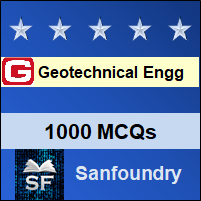
Geotechnical Engineering - I Multiple Choice Questions Highlights
- 1000+ Multiple Choice Questions & Answers (MCQs) in Geotechnical Engineering - I with a detailed explanation of every question.- These MCQs cover theoretical concepts, true-false(T/F) statements, fill-in-the-blanks and match the following style statements.
- These MCQs also cover numericals as well as diagram oriented MCQs.
- These MCQs are organized chapterwise and each Chapter is futher organized topicwise.
- Every MCQ set focuses on a specific topic of a given Chapter in Geotechnical Engineering - I Subject.
Who should Practice Geotechnical Engineering - I MCQs?
– Students who are preparing for college tests and exams such as mid-term tests and semester tests on Geotechnical Engineering - I.- Students who are preparing for Online/Offline Tests/Contests in Geotechnical Engineering - I.
– Students who wish to sharpen their knowledge of Geotechnical Engineering Subject.
- Anyone preparing for Aptitude test in Geotechnical Engineering.
- Anyone preparing for interviews (campus/off-campus interviews, walk-in interview and company interviews).
- Anyone preparing for entrance examinations and other competitive examinations.
- All - Experienced, Freshers and College / School Students.
Geotechnical Engineering - I Chapters
Here's the list of chapters on the "Geotechnical Engineering - I" subject covering 100+ topics. You can practice the MCQs chapter by chapter starting from the 1st chapter or you can jump to any chapter of your choice.- Preliminary Definitions and Relationships
- Index Properties Determination
- Classification of Soils
- Soil Structure and Clay Minerology
- Soil Water Effective and Neutral Stresses
- Permeability
- Well Hydraulics
- Seepage Analysis
- Drainage and Dewatering
- Elements of Elasticity
- Stress Distribution
- One Dimensional Consolidation
- Compaction
- Shear Strength
1. Preliminary Definitions and Relationships
The section contains multiple choice questions and answers on void ratio, porosity, degree of saturation, density index, relative compaction, soil as three phase system, functional relationships and uniform spheres packing.
|
|
|
2. Index Properties Determination
The section contains questions and answers on sedimentation analysis, consistency of soils, water content, sieve analysis, particle size distribution, clays sensitivity and thixotropy, liquid determination, collapsible soils, shrinkage limit, pipette and hydrometer method.
3. Classification of Soils
The section contains MCQs on particle size classification, textural classification, unified and indian standard classification.
|
|
|
4. Soil Structure and Clay Minerology
The section contains multiple choice questions and answers on honey comb structure as well as soil structure, structures like single grained, flocculent, dispersed and honey comb, atomic and molecule bonds and clay minerals.
|
|
|
5. Soil Water Effective and Neutral Stresses
The section contains questions and answers on capillary water and its potential, frost action, capillary siphoning, swelling of soil and stress conditions in soil.
6. Permeability
The section contains MCQs on darcys law and its validity, poiseuille’s law, permeability test, jodhpur permeamter and capillarity permeability test.
7. Well Hydraulics
The section contains multiple choice questions and answers on dupuits theory, recuperation test, pumping in and pumping out tests.
|
|
|
8. Seepage Analysis
The section contains questions and answers on seepage pressure, flow net application, laplace equation, khoslas theory, phreatic line of earth dam with and without filter.
9. Drainage and Dewatering
The section contains MCQs on shallow and deep well system, electro-osmosis method, seepage analysis, well point system and protective filters.
|
|
|
10. Elements of Elasticity
The section contains multiple choice questions and answers on stress state at point, equilibrium and boundary condition equations, strain components and compatibility equations, hookes law and stress functions.
|
|
|
11. Stress Distribution
The section contains questions and answers on stresses, boussinesq equations, pressure distribution diagrams, vertical pressure, equivalent point load method, newmark’s influence chart, contact pressure, triangular loadings, vertical and horizontal pressure.
12. One Dimensional Consolidation
The section contains MCQs on consolidation process, undisturbed specimen consolidation, terzaghi’s theory of one dimensional consolidation, voids ratio calculations and volume change coefficient, consolidation problems, secondary and three dimensional consolidation.
13. Compaction
The section contains multiple choice questions and answers on effect of compaction on soil properties, field compaction test, harvard miniature compaction test, jodhpur mini compactor and standard proctor test.
14. Shear Strength
The section contains questions and answers on mohrs stress circle as well as coulomb failure theory, shear test and also tri axial compression test, unconfined compression test.
|
|
|
Wish you the best in your endeavor to learn and master Geotechnical Engineering - I!
